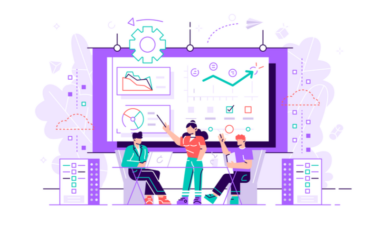Can I Become a Data Scientist at 40?

In this article
It’s never too late to start your data science journey. Although mid-career pivots can be daunting, it’s possible to become a data scientist at any age.
Contrary to popular belief, a degree in computer science or statistics—although useful—is not necessary to pursue a new career in data science; you can gain the practical knowledge and technical skills sought by hiring managers through independent study or online bootcamps.
Whether you’re looking to upskill or you’re starting from a place unrelated to tech, there is no shortage of courses and programs that will help you achieve your goals.
No degree? No problem. Whether you’re considering a career change or have taken a winding road to get here, the data science profession is welcoming to analytical minds that are equipped with the right skills. Read on to learn how to launch a data science career at any age.
What does a data scientist do?
Data science revolves around using machine learning, statistics, and other computational skills to tease out meaningful and actionable insights from collected data. At their best, data scientists help organizations understand key findings from the information collected so that they can make informed, data-backed decisions instead of shooting in the dark.
Here are a few key data scientist responsibilities:
- Data collection and management. Data scientists collect, clean, and organize masses of structured and unstructured data. With the help of framework tools, data scientists order and store this data in libraries, databases, and warehouses.
- Data querying and consumption. Through a process called data mining, data scientists query and explore stored data using SQL. Data mining is a critical aspect of data analysis.
- Forecasting and modeling. Data scientists use statistical methods to identify trends, patterns, and groups within data sets. These analytical tools are used to predict future events, test hypotheses, and illuminate the significance of data.
Data scientists also use machine learning algorithms to analyze and extract information from data. Machine learning helps data scientists make informed predictions and recommendations that an organization will find useful.
Do you need a degree to become a data scientist?
No. When filling a data science role, hiring managers look for evidence that a candidate has the skills to get the job done. This typically takes the form of a portfolio with case studies that highlight a candidate’s technical skills, problem-solving process, and ability to wrangle data sets to find actionable insights—all of which can be learned and fostered outside of a college setting.
While degrees related to data and computer science can be useful in laying a foundational understanding of statistics and coding, many online courses, bootcamps, and, to some extent, self-study, have proven effective at helping candidates pick up the skills and build on the experience needed to be job-ready.
Get To Know Other Data Science Students
Jonas Cuadrado
Senior Data Scientist at Feedzai
George Mendoza
Lead Solutions Manager at Hypergiant
Ginny Zhu
Data Science Intern at Novartis
How online bootcamps can help you become a data scientist
Aspiring data scientists can acquire skills and experience outside of degree programs through independent study or virtual bootcamps. While teaching yourself allows you to move at whatever pace you choose, an online bootcamp will provide the structure and support you need to get hired as a data scientist.
Here is why data science bootcamps are so effective:
- Bootcamps focus on applied knowledge. A top-tier bootcamp teaches technical concepts via hands-on projects to ensure that students master real-world skills.
- Bootcamps offer industry mentorships. Quality programs match each student with an industry mentor to guide them through the course and beyond.
- Bootcamps help you build a portfolio. Your bootcamp experience will culminate in the completion of capstone projects that address realistic problems and scenarios. These projects will form the foundation of a professional portfolio that you can show to future employers.
- Bootcamps provide career counseling. Bootcamps are structured to get you hired. Mock interviews, networking assistance, and resumé advice are just a few of the career support tools that bootcamps offer. Programs that offer a job guarantee will refund your tuition if you aren’t hired within six months after graduating.
It’s never too late to become a data scientist
As long as you’ve got the right skills, you can become a data scientist at any age. Want proof? Fast Company highlighted the successful mid-career pivots of three women who moved from design and communications roles to data science.
- Rebekah Iliff spent the first half of her career as a PR creative. After investigating issues related to calculating ROI on PR campaigns, she transitioned into the role of chief strategy officer at AirPR, an analytics-driven PR company. As chief strategy officer, Rebekah focused on extracting value from PR data to inform the company’s campaign budgets.
- Sce Pike worked in art and web design before moving into a human factors design role at Qualcomm, where she used data science to analyze human-machine interactions.
- Micheline Casey worked in marketing before she “fell in love with data” and transitioned into the world of tech. She subsequently was appointed Chief Data Officer of the Colorado state government, and then served as the Federal Reserve’s first Chief Data Officer. Today, Micheline works as the Chief Data Officer of A.P. Moller – Maersk, an integrated transport and logistics company.
Curious about people who have made mid-career pivots with the help of a data science bootcamp? Former reporter Chong Zi Liang reflects in a blog post on his transition from communications to data science at the age of 34. With no prior tech experience, Chong took several short coding courses before enrolling in a 12-week data science bootcamp.
Related: How To Navigate a Midlife Career Change Like a Pro
After graduation, he landed a data science role at 99.co, a geospatial property search engine. Chong feels that his background in communications augments his ability to organize data-driven insights in a way that facilitates stakeholder decision-making.
Since you’re here…
Curious about a career in data science? Experiment with our free data science learning path, or join our Data Science Bootcamp, where you’ll only pay tuition after getting a job in the field. We’re confident because our courses work – check out our student success stories to get inspired.





